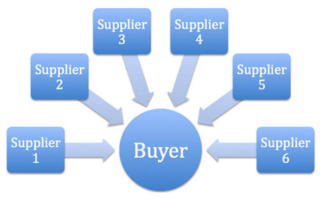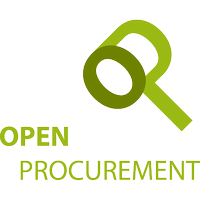Business-to-government (B2G), also known as business-to-public-administration (B2PA) or business-to-public-sector (B2PS) refers to trade between the business sector as a supplier and a government body as a customer playing a major impact in public procurement. Business-to-government also includes the segment of business-to-business (B2B) marketing known as public sector marketing — a form of business-to-business-to-government (B2B2G) phenomenon, which encompasses marketing products and services to various government levels—local, state/provincial, and national—through integrated marketing communications techniques such as strategic public relations, branding, marketing communications, advertising, and web-based communications.
Procurement is the method of discovering and agreeing to terms and purchasing goods, services, or other works from an external source, often with the use of a tendering or competitive bidding process. The term may also refer to a contractual obligation to "procure", i.e. to "ensure" that something is done. When a government agency buys goods or services through this practice, it is referred to as government procurement or public procurement.

The Crown Commercial Service (CCS) is an executive agency and trading fund of the Cabinet Office of the UK Government. The CCS is responsible for managing the procurement of common goods and services, increasing savings for the taxpayer by centralising buying requirements, and leading on procurement policy on behalf of the government.
E-procurement is the business-to-business or business-to-consumer or business-to-government purchase and sale of supplies, work, and services through the Internet as well as other information and networking systems, such as electronic data interchange and enterprise resource planning.
Government procurement or public procurement is undertaken by the public authorities of the European Union (EU) and its member states in order to award contracts for public works and for the purchase of goods and services in accordance with principles derived from the Treaties of the European Union. Such procurement represents 13.6% of EU GDP as of 2018, and has been the subject of increasing European regulation since the 1970s because of its importance to the European single market.
Sustainable procurement or green procurement is a process whereby organizations meet their needs for goods, services, works and utilities in a way that achieves value for money on a life-cycle basis while addressing equity principles for sustainable development, therefore benefiting societies and the environment across time and geographies. Procurement is often conducted via a tendering or competitive bidding process. The process is used to ensure the buyer receives goods, services or works for the best possible price, when aspects such as quality, quantity, time, and location are compared. Procurement is considered sustainable when organizations broadens this framework by meeting their needs for goods, services, works, and utilities in a way that achieves value for money and promotes positive outcomes not only for the organization itself but for the economy, environment, and society. This framework is also known as the triple bottom line, which is a business accounting framework. The concept of TBL is narrowly prescribed, and even John Elkington, who coined the term in the 1990s, now advocates its recall. Indeed, procurement practitioners have drawn attention to the fact that buying from smaller firms, locally, is an important aspect of sustainable procurement in the public sector. Ethics, culture, safety, diversity, inclusion, justice, human rights and the environment are additionally listed as important aspects of SPP.

Government procurement or public procurement is the procurement of goods, services and works on behalf of a public authority, such as a government agency. Amounting to 12 percent of global GDP in 2018, government procurement accounts for a substantial part of the global economy.
Government procurement in Russia relates to the public procurement in Russia by all governmental, regional and local authorities. The government procurement in Russia represents a big segment of the budgetary expenses. The volume of government purchases makes about 25 trillion rubles in 2015 and 30 trillion rubles in 2016. The government purchases system is constantly modernized due to changes in legislation, technical components and information.
Forward Commitment Procurement (FCP) is a procurement model that is designed to be used to deliver cost-effective environmental products and services to the public sector and help to create the market conditions in which the environmental goods and services sector can thrive.
An economic operator is a business or other organisation which supplies goods, works or services within the context of market operations. The term is used in public procurement to cover suppliers, contractors and service providers.
A tender notification is the publication and circulation of procurement opportunities by the procuring entity in various media like: Newspapers, purchasers's own website and government tender bulletin etc. The main objective of wider publicity is to make these opportunities available to a wider supplier community, increase the competition and thus making the procurement process efficient and transparent. In pre-internet era the tenders were published only in the print media but the internet has made it possible to publish the tenders online and make these opportunities available to suppliers globally, on a click of mouse. Though some countries have moved completely to online publication of tender notification, but still there are many countries which are publishing tenders in print media as well. It depends upon the commitment and preparedness of the leadership to make the public procurement efficient and corruption free. The World Bank started bench-marking economies on the basis of legal and regulatory system, which can affect the ability of the suppliers to participate in public procurement process. The latest report from The World Bank - Bench-marking Public Procurement, 2017 assesses 180 economies around the world.

A reverse auction is a type of auction in which the traditional roles of buyer and seller are reversed. Thus, there is one buyer and many potential sellers. In an ordinary auction also known as a forward auction, buyers compete to obtain goods or services by offering increasingly higher prices. In contrast, in a reverse auction, the sellers compete to obtain business from the buyer and prices will typically decrease as the sellers underbid each other.

An invitation to tender is a formal, structured procedure for generating competing offers from different potential suppliers or contractors looking to obtain an award of business activity in works, supply, or service contracts, often from companies who have been previously assessed for suitability by means of a supplier questionnaire (SQ) or pre-qualification questionnaire (PQQ).
The UK Government G-Cloud is an initiative targeted at easing procurement by public-sector bodies in the United Kingdom of commodity information technology services that use cloud computing. The G-Cloud consists of:
The European Single Procurement Document (ESPD) is an electronic self-declaration document to be submitted by suppliers interested in tendering for contracts for the supply of goods, works or services to public bodies located anywhere within the European Union.

Prozorro is a public electronic procurement system where state and municipal customers announce tenders to purchase goods, works and services, and business representatives compete for the opportunity to become a state supplier.

OpenProcurement is an open source procurement software toolkit that automates procurement processes. It provides tools to design and build a transparent and competitive procurement process backed by strong data collection, electronic documents, and detailed reporting.
At around £290 billion every year, public sector procurement accounts for around a third of all public expenditure in the UK. EU-based laws continue to apply to government procurement: procurement is governed by the Public Contracts Regulations 2015, Part 3 of the Small Business, Enterprise and Employment Act 2015, and the Public Contracts (Scotland) Regulations of 2015 and 2016. These regulations implement EU law, which applied in the UK prior to Brexit, and also contain rules known as the "Lord Young Rules" promoting access for small and medium enterprise (SMEs) to public sector contracts, based on Lord Young's Review Growing Your Business, published in 2013.
Great British Railways (GBR) is a proposed state-owned public body that will oversee rail transport in Great Britain except for Transport for London, Merseytravel, light rail and tram services. It will assume most rail functions of the Department for Transport (DfT) and the Rail Delivery Group, including procuring services and setting fares. In addition, it will absorb Network Rail to become the operator of most rail infrastructure across Great Britain. It will not affect the existing powers of the UK's devolved administrations in their areas.





